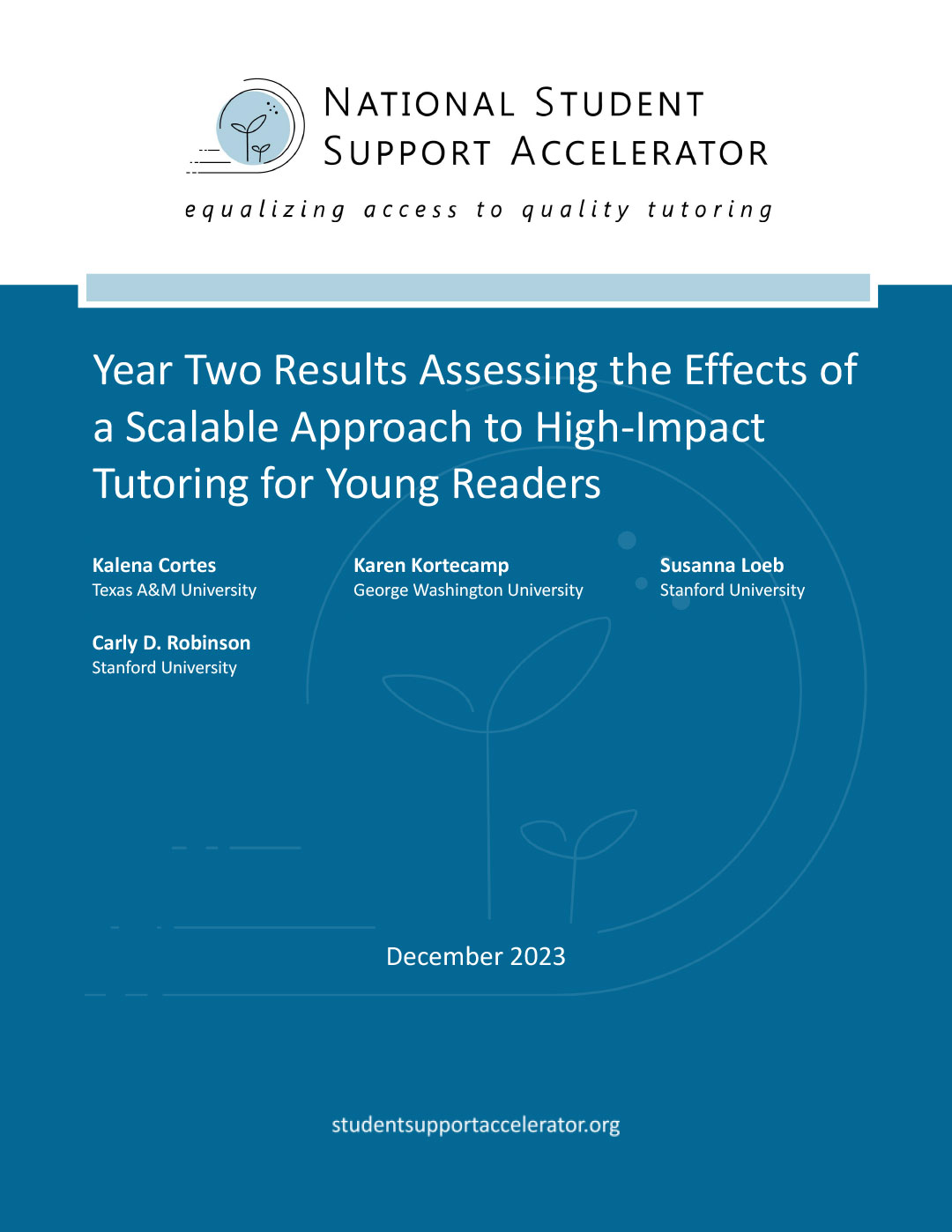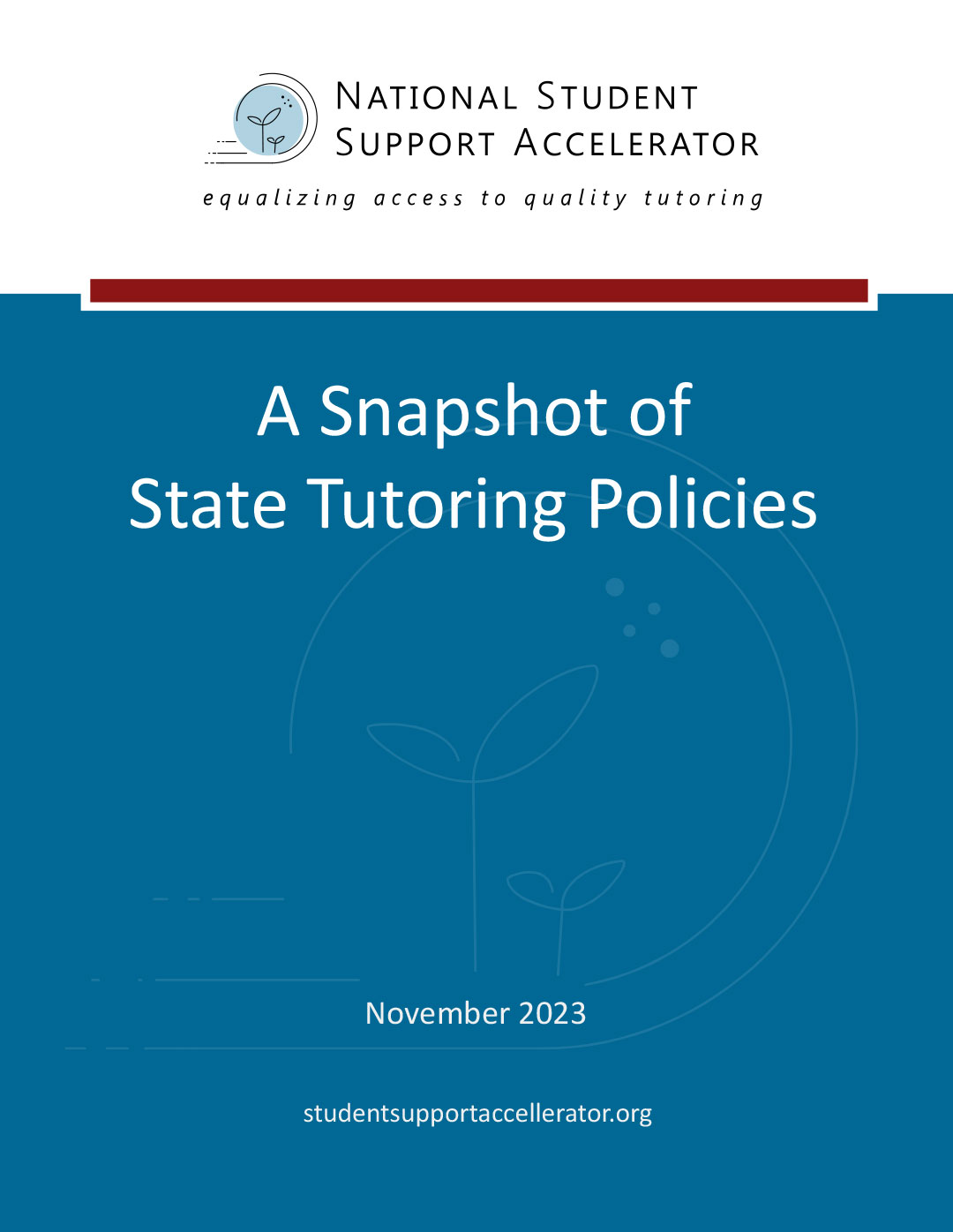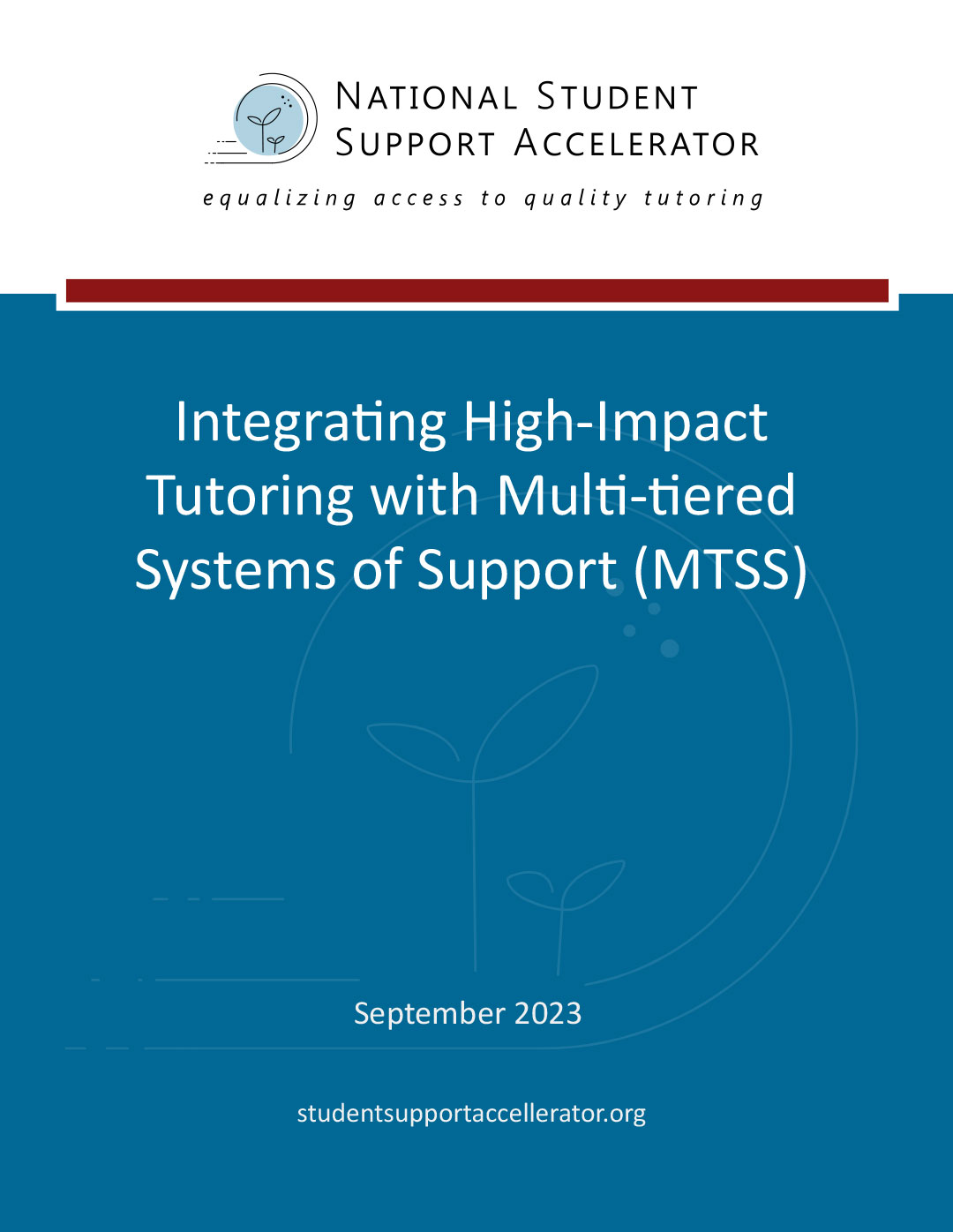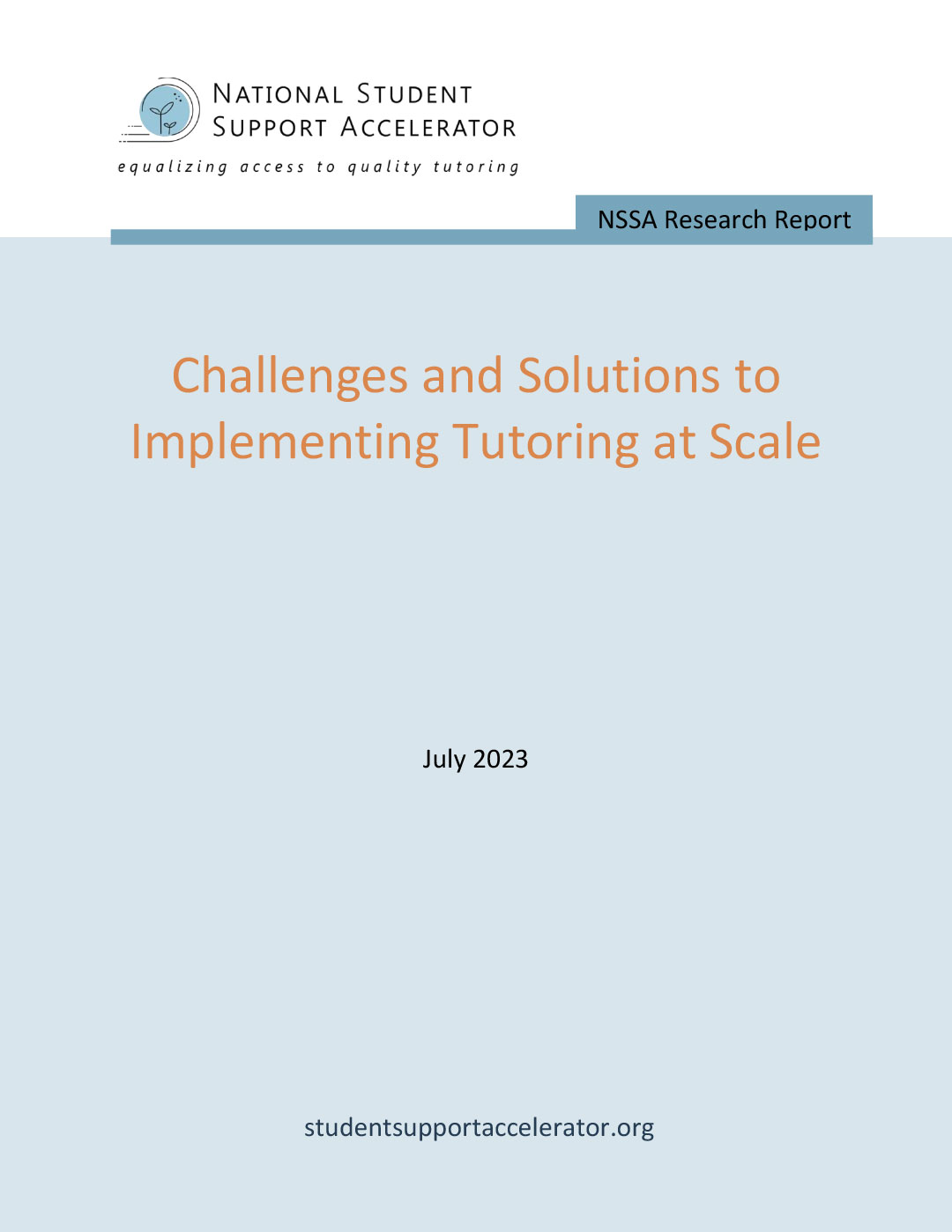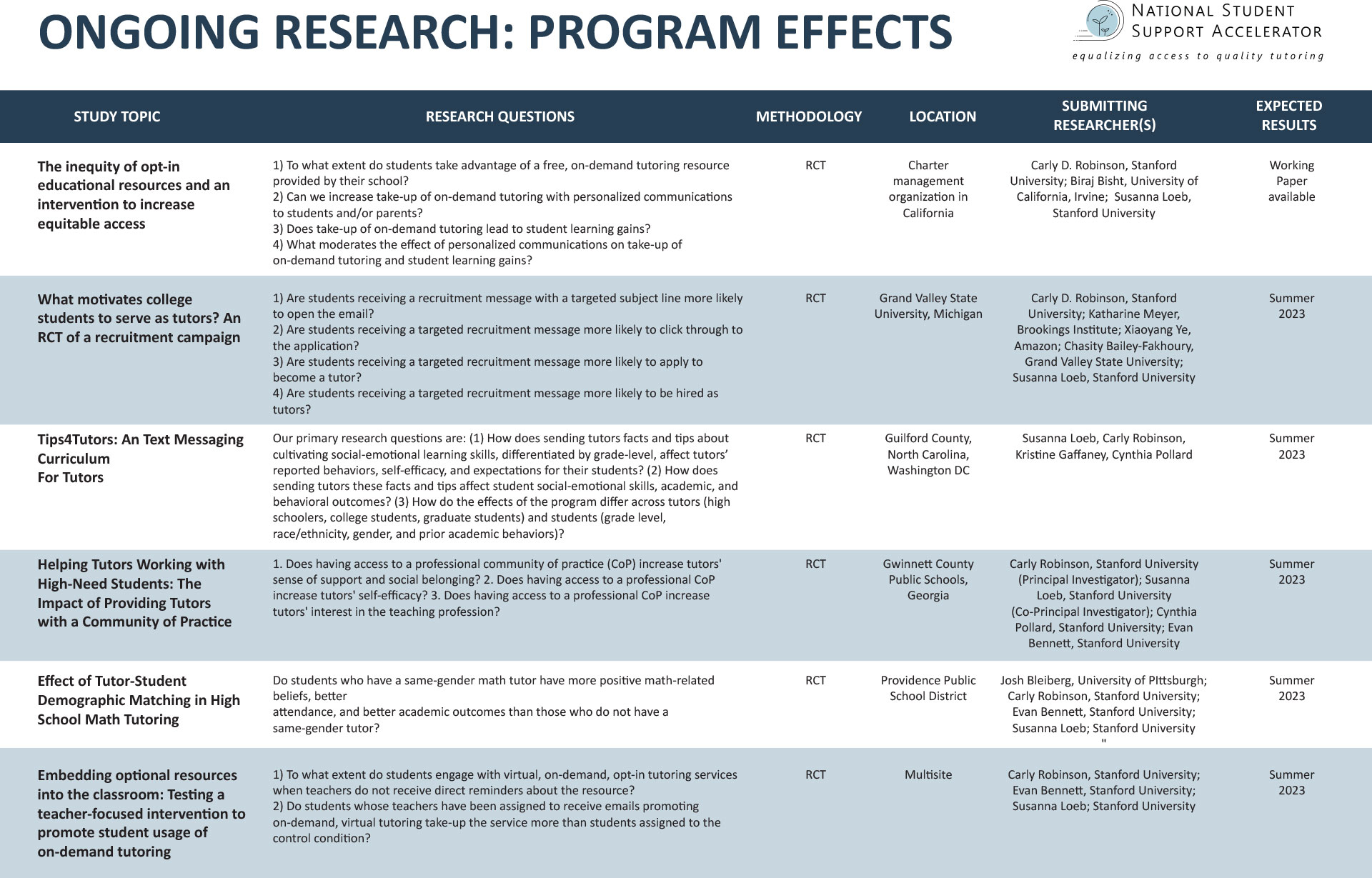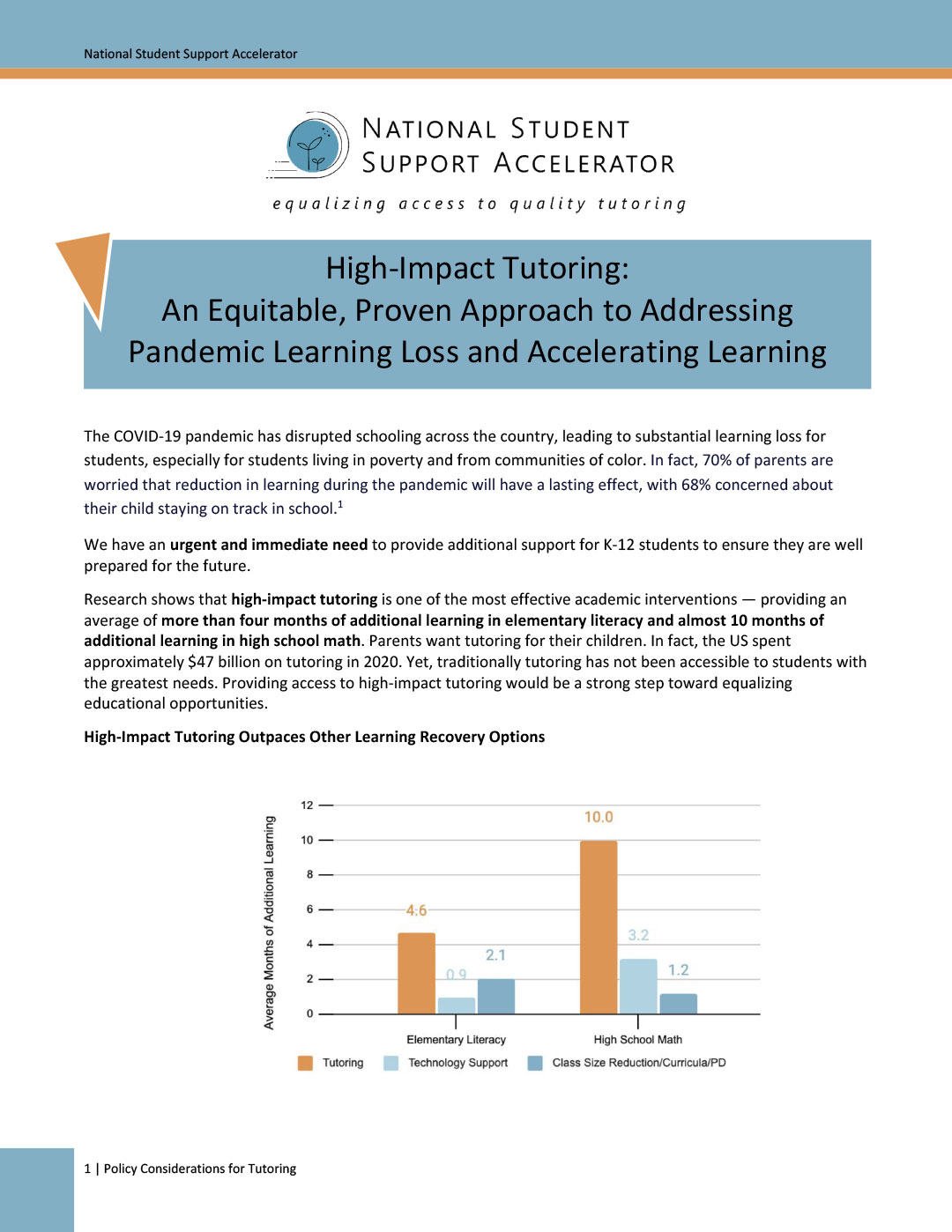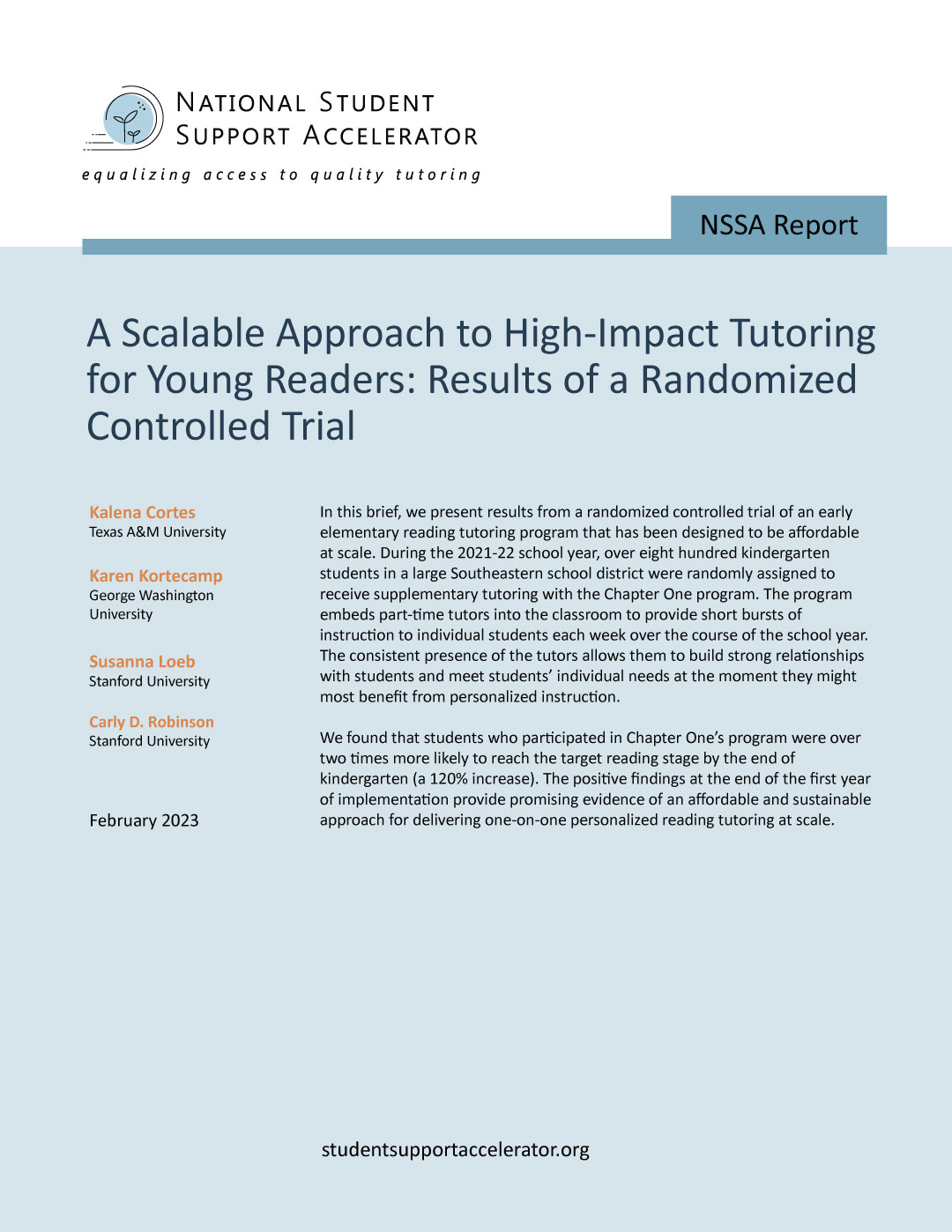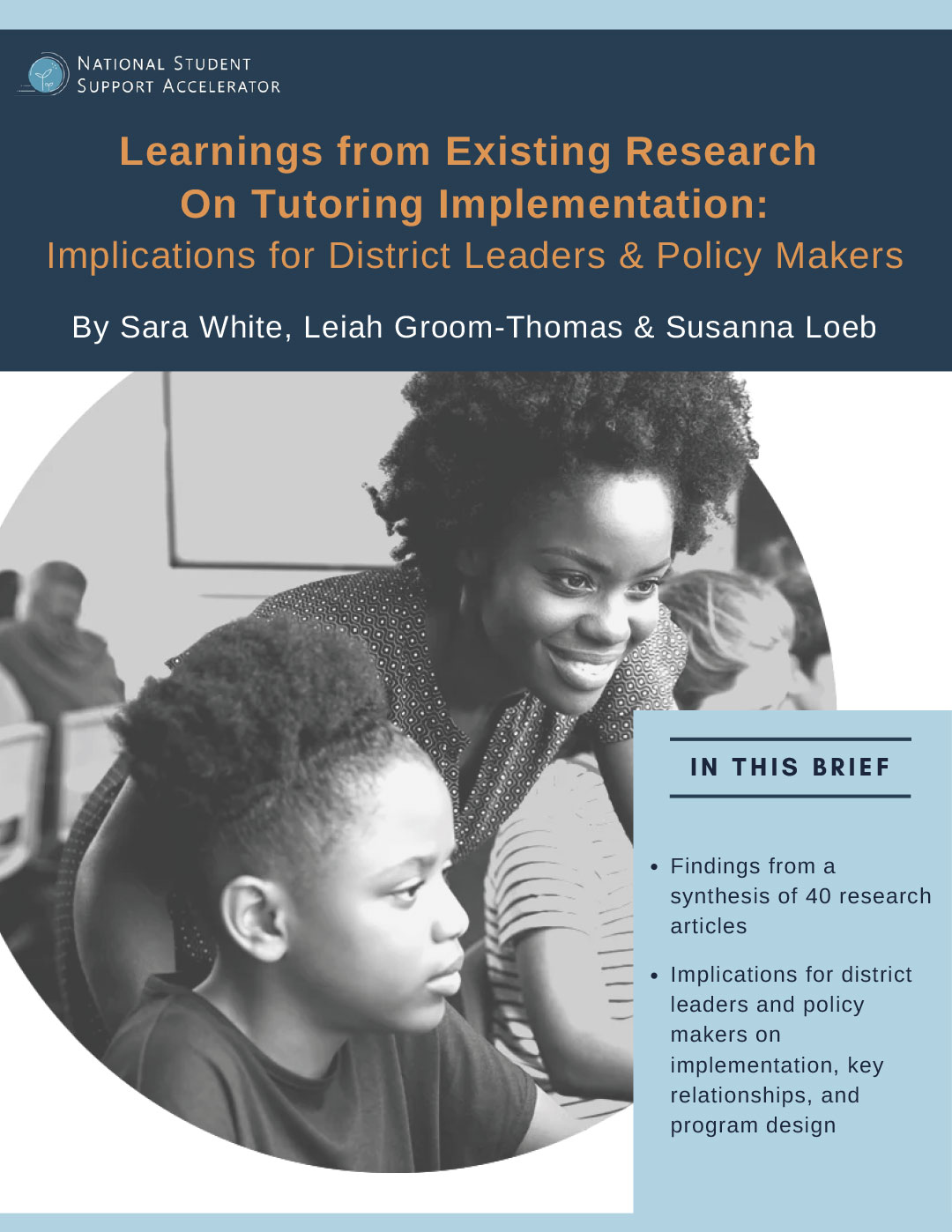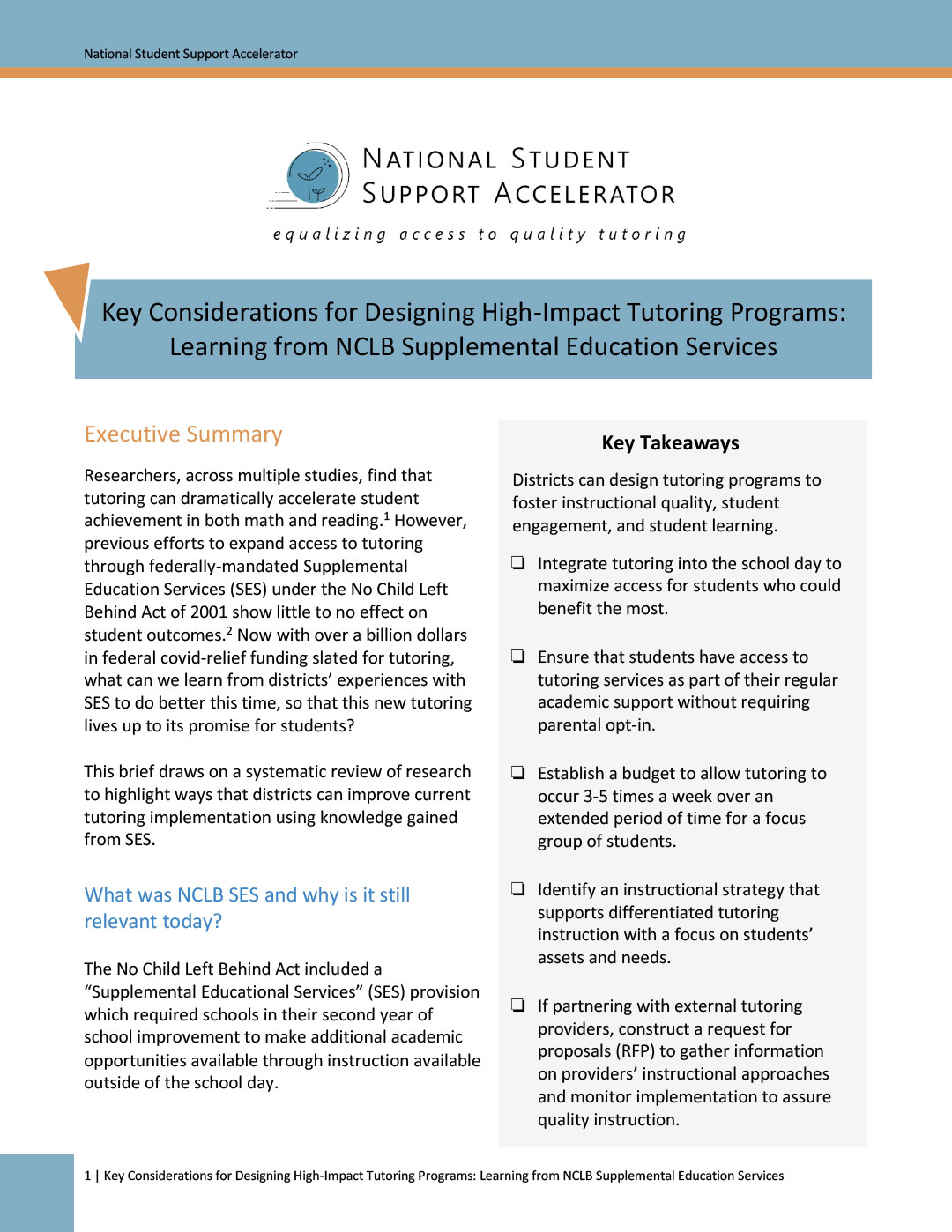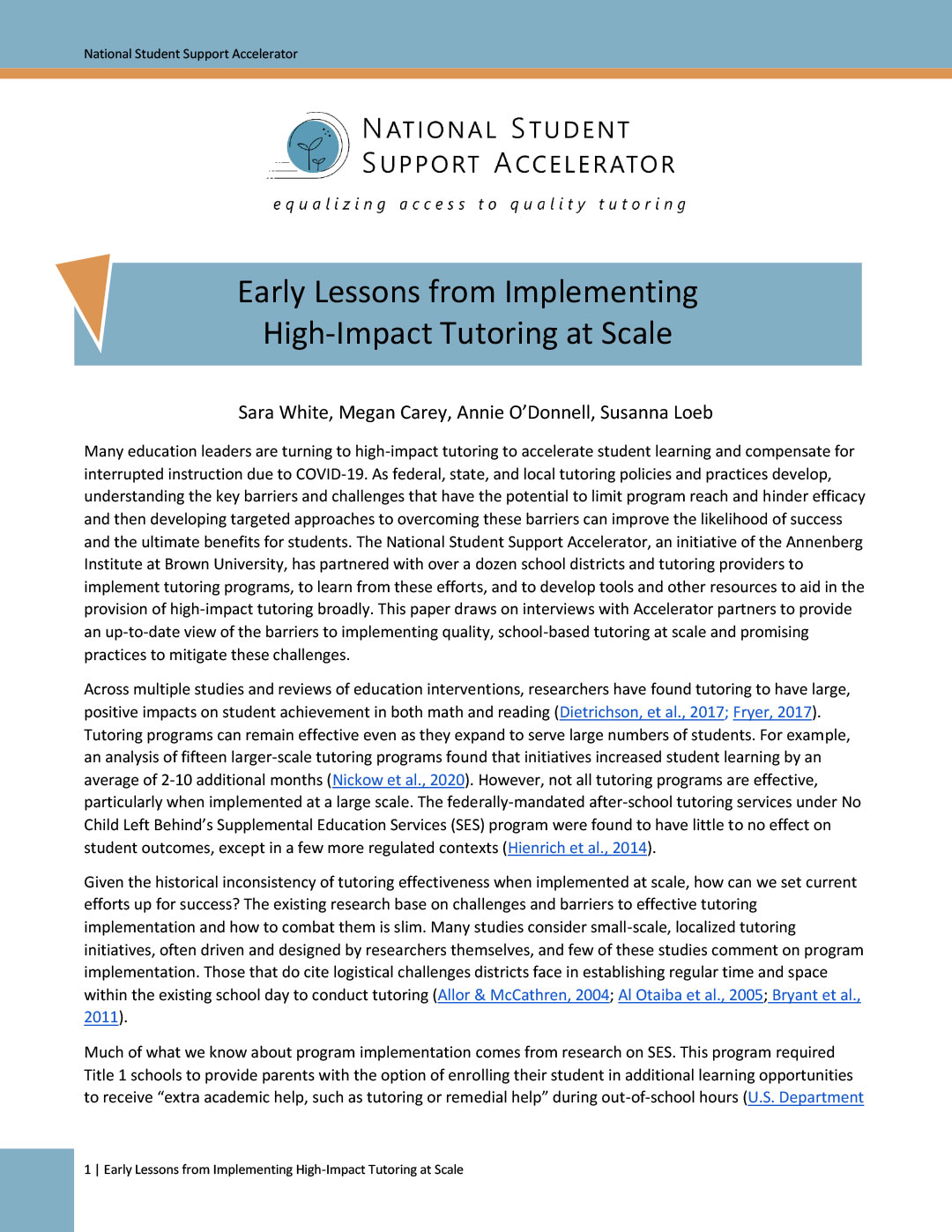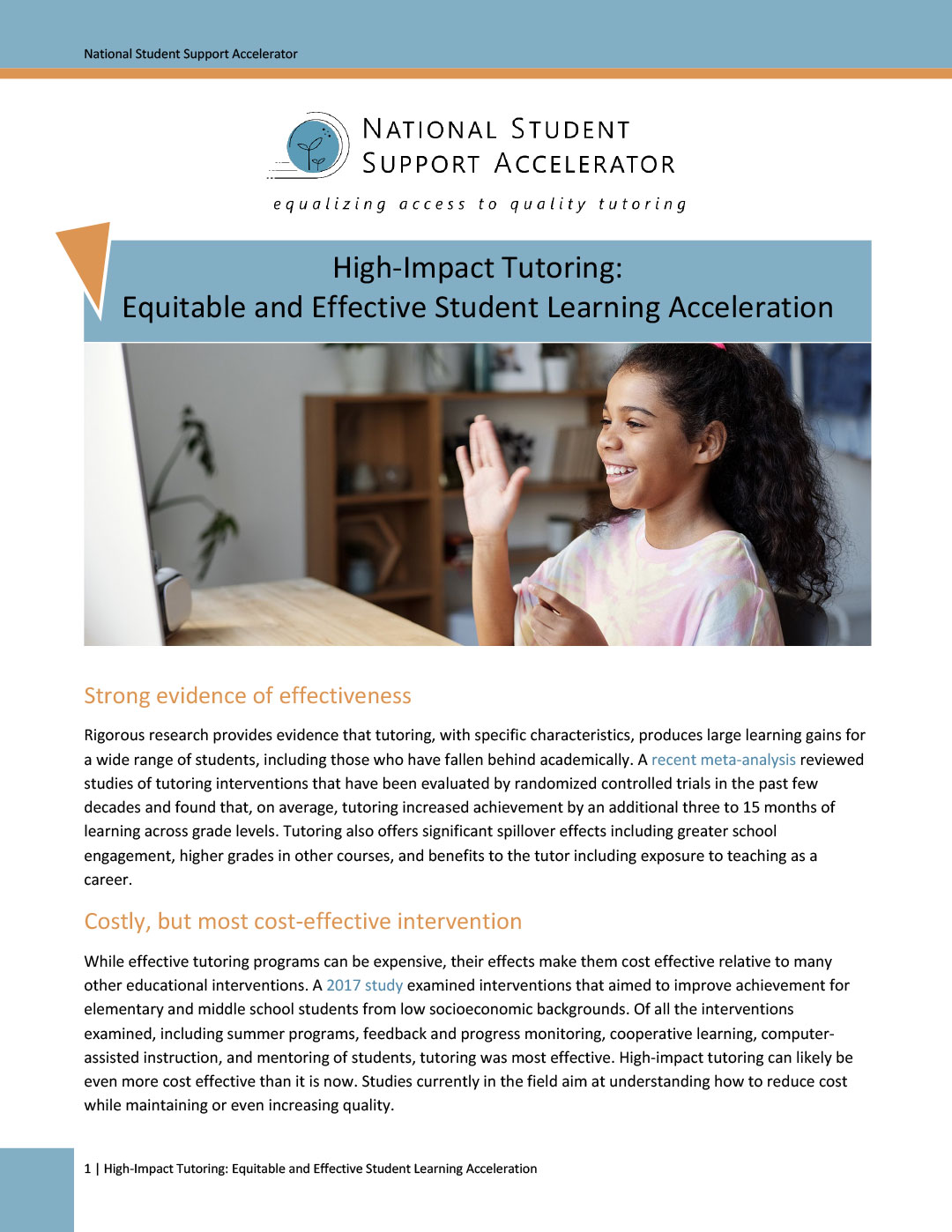Outcomes-Based Contracting for Tutoring: Insights and Recommendations
Contracting relationships between public school districts and vendors are a common feature of education provision in the United States. Contracted services in schools can range from broad, essential functions such as school meals, bussing, and janitorial services to more specialized services such as the analysis of student data,… more
Learning Curve: Lessons from the Tutoring Revolution in Public Education
How often does it happen that a national policy priority, robust research, and the aspirations of classroom teachers converge? On an issue with bipartisan support, no less? Not very often. But tutoring is an exception. As many as 80 percent of school districts and charter school organizations have launched tutoring programs to help… more
Year Two Results Assessing the Effects of a Scalable Approach to High-Impact Tutoring for Young Readers
This research report presents the results from the second year of a randomized controlled trial of an early elementary reading tutoring program that has been designed to be affordable at scale. During the 2021-22 school year, over eight hundred kindergarten students in a large Southeastern school district were randomly assigned to receive… more
Funding for High-Impact Tutoring
This brief provides an overview of available funding for high-impact tutoring programs beyond Covid-19 relief funding (ESSER). Many streams of funding, on their own or braided together, can pay for high-impact tutoring in U.S. schools.
A Snapshot of State Tutoring Policies
As schools, districts, and states work to address the student needs following the pandemic, many turned to high-impact tutoring, a research-based approach to providing individualized instruction to students. In fact, thirty-seven percent of public schools reported providing “high-dosage” tutoring on a federal school pulse panel survey in… more
The Effects of Virtual Tutoring on Young Readers: Results from a Randomized Controlled Trial
This study is the first randomized controlled trial of a virtual early literacy tutoring program. OnYourMark Education provides tutoring grounded in the science of reading and focused on foundational literacy skills (e.g., phonics, phonological awareness, reading fluency). During the 2022-23 school year, OnYourMark partnered with 12… more
Integrating High-Impact Tutoring with Multi-tiered Systems of Support (MTSS)
Districts across the nation use Multi-Tiered Systems of Support (MTSS) to target appropriate supports for each student. High-impact tutoring is the most effective research-backed academic support – consistently demonstrating from six months to over two years of learning gains for students across grade levels and content areas in a single… more
Challenges and Solutions to Implementing Tutoring at Scale
Many districts sought to provide students with high-impact tutoring in response to pandemic-induced learning needs. Some started earlier than others, and we aimed to learn from the experiences of the early adopters to help inform a smoother implementation among those beginning the process later. During the 2021-22 school year, we… more
Research in Progress to Better Understand High-Impact Tutoring
This report lists ongoing and planned research studies related to high-impact tutoring, collected from researchers invited to the annual National Student Support Accelerator Conference in May 2023. Research studies are divided into three broad categories of work: Program effects, effects of program characteristics, and implementation.
Types of Tutoring: Effectiveness and Equity
The evidence is clear that tutoring can help students learn. Researchers have studied many tutoring programs and, over and over, have found strong benefits for students. In fact, we know of few other options for helping individual students catch up to grade level. Tutoring is the best known approach for acceleration and it can… more
Policy Considerations for Tutoring
High-Impact Tutoring: An Equitable, Proven Approach to Addressing Pandemic Learning Loss and Accelerating Learning The COVID-19 pandemic has disrupted schooling across the country, leading to substantial learning loss for students, especially for students living in poverty and from communities of color. In fact, 70% of parents are… more
A Scalable Approach to High-Impact Tutoring for Young Readers: Results of a Randomized Controlled Trial
In this brief, we present results from a randomized controlled trial of an early elementary reading tutoring program that has been designed to be affordable at scale. During the 2021-22 school year, over eight hundred kindergarten students in a large Southeastern school district were randomly assigned to receive supplementary tutoring… more
Do Teachers Support High-Impact Tutoring? A Survey Experiment
In the wake of the COVID-19 pandemic, tutoring has increasingly become a popular tool for learning recovery. By the end of the 2021-22 school year, 23 states (including the District of Columbia) initiated or passed legislation mandating or encouraging tutoring initiatives, and federal pandemic relief funds were made available for school… more
Using the American Rescue Plan Act Funding For High-Impact Tutoring
As we emerge from the Covid-19 pandemic and schools reopen their doors to in-person learning, we are faced with the challenge of reengaging students — many of whom have been chronically absent from school and have experienced severe social stresses. With students having faced an extraordinary range of experiences during the past year, a… more
Learnings from Existing Research On Tutoring Implementation: Implications for District Leaders & Policy Makers
High-Impact tutoring – one-to-one or small group instruction in which a human tutor supports students in an academic subject area – has emerged as the primary strategy for addressing Covid19-induced learning interruptions. As tutoring expands nationally, what can we learn from existing research to inform effective planning and… more
Key Considerations for Designing High-Impact Tutoring Programs: Learning from NCLB Supplemental Education Services
Researchers, across multiple studies, find that tutoring can dramatically accelerate student achievement in both math and reading.1 However, previous efforts to expand access to tutoring through federally-mandated Supplemental Education Services (SES) under the No Child Left Behind Act of 2001 show little to no effect on student outcomes… more
Early Planning Needed to Know Your Tutoring Program’s Effectiveness
Substantial new federal funds, such as those from the American Rescue Plan Act (ARPA), are allowing districts to provide students with services such as tutoring that were not financially feasible in the past. Are these new programs cost-effective enough to merit allocating other funds to sustain them, such as Title I and Title IV… more
Early Lessons from Implementing High-Impact Tutoring at Scale
Many education leaders are turning to high-impact tutoring to accelerate student learning and compensate for interrupted instruction due to COVID-19. As federal, state, and local tutoring policies and practices develop, understanding the key barriers and challenges that have the potential to limit program reach and hinder efficacy and… more
How to Gather Rigorous Evidence of Your Program’s Effectiveness
Ideally every tutoring initiative leads to positive student outcomes. The evidence is very strong that tutoring can benefit students. However, some programs are likely to be more effective than others. How can we be sure that an investment in tutoring is paying off? Well-designed evaluations can provide definitive evidence about how much… more
High-Impact Tutoring: Equitable and Effective Learning Acceleration
Rigorous research provides evidence that tutoring, with specific characteristics, produces large learning gains for a wide range of students, including those who have fallen behind academically. A recent meta-analysis reviewed studies of tutoring interventions that have been evaluated by randomized controlled trials in the past few… more
Funding Tutoring Programs
While tutoring is cost-effective, it is also costly. However, significant funding is available, with more to come through pending COVID-19-related legislation. In many cases, successful high-impact tutoring programs will pursue, access and combine funding through several sources. Major funding sources include: national service programs… more


